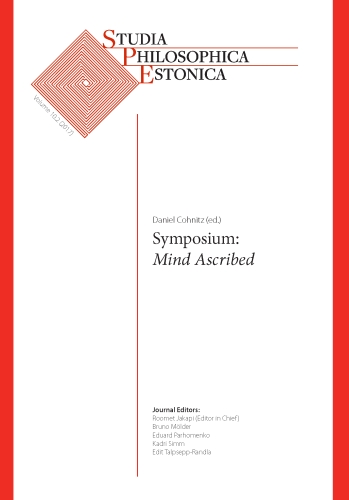Interpretivism and “Canonical” Ascriptions
DOI:
https://doi.org/10.12697/spe.2017.10.2.05Keywords:
meaning, truth, interpretationAbstract
The following paper investigates the crucial notion of a “canonical ascription statement” in Bruno Mölder’s Mind Ascribed, and argues that the reasons given for preferring the book’s approach of canonicality to a more common understanding of canonicality in terms of the ascriptions we would “ideally” make are not only unpersuasive, but also leave the interpretivist position more open to skeptical worries than it should be. The paper further argues that the resources for a more compelling justification of Mölder’s conception of canonicality are already in Mölder’s book itself.
References
Child, W. (1994). Causality, Interpretation and the Mind, Oxford University Pre Oxford.
Churchland, P. (1981). Eliminative materialism and the propositional attitudes, the Journal of Philosophy 78: 67-90.
Davidson, D. (1980). Mental events, in D. Davidson (ed.), Essays on Actions and Events, Oxford University Press, pp. 207-225.
Davidson, D. (1986). A coherence theory of truth and knowledge, in E. Lepore (ed.), Truth and Interpretation: Perspectives on the Philosophy of Donald
Davidson, Blackwell.
Johnston, M. (1993). Objectivity refigured: Pragmatism without verification, in J. Haldane and C.Wright (eds), Reality, Representation, and Projection,
Oxford University Press, New York, pp. 85-130.
McDowell, J. (1985). Functionalism and anomalous monism, in E. Lepore and B. McLaughlin (eds), Actions and Events, Blackwell, Oxford.
Misak, C. (2013). The American Pragmatists, Oxford University Press, New York.
Mölder, B. (2010). Mind Ascribed: An elaboration and defence of interpretivism, John Benjamins Publishing, Amsterdam.
Peirce, C. S. (1992a). The fixation of belief, in C. S. Peirce (ed.), The Essential Peirce, Vol. Indiana University Press, Indianapolis.
Peirce, C. S. (1992b). How to make our ideas clear, in C. S. Peirce (ed.), The Essential Peirce, Vol. Indiana University Press, Indianapolis.
Wright, C. (1992). Truth and Objectivity, Harvard University Press, Cambridge, MA.





